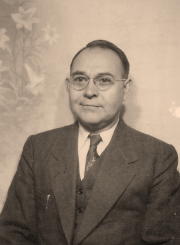SUNNY CAL JOURNAL - Calhoun Eccentric: Eddie's Will And Testament, Plan For World Peace
By Bob Weaver
One of Calhoun's most famous eccentrics, Eddie Austin Kirby, was fascinated about his death, writing about the 40 plus assassination attempts on his life.
He wanted to leave a legacy.
 After penning his book "Many Are Called, But Few Chosen," it was obvious that Eddie (pictured left) was both called and chosen, carefully laying his plans for the afterlife and writing a 10-page will, containing detailed directions regarding the disposition of his worldly assets.
After penning his book "Many Are Called, But Few Chosen," it was obvious that Eddie (pictured left) was both called and chosen, carefully laying his plans for the afterlife and writing a 10-page will, containing detailed directions regarding the disposition of his worldly assets.
While the focus of his will was his oil and gas lease holdings, he offered instructions to those inheriting his assets how they could be successful in using them, including where future drillers should drill their wells.
Eddie managed to acquire leases in five counties, but for the most part, failed to become successful as a producer, although he gave it a heck of a try.
His most famous drilling operation may have been the drilling of a water well on the Calhoun courthouse lawn, a protest to the insertion of fluoride in the public water system.
He was fascinated with the possibility of deep well drilling, an enterprise that still evades Calhoun County. He went so far, in his will, to locate the best deep well locations.
Those hundreds of deep well researchers who have graced the Calhoun courthouse, might do well to reach Eddie's calculations.
He labored for years on a drilling project at the foot of Joker Hill, not far from the Village of Hur, often returning to Calhoun while on vacation from his US Postal job in the DC area.
He was concerned about the copyright on his written work about world peace, leaving the document to the Cherokee Indian tribe "to use the work of said copyrights to bring forth World Peace to all people of the world, just as soon as possible after my death."
In his book, he was throughly convinced that the USA would be "ruled by monopolies (in sheep's clothing), dictators (in sheep's clothing) and vote buyers (in sheep's clothing)," and issued dozens of warnings to readers about the death of American democracy.
He felt the appointment of federal judges would be the ruination of the nation, and all judges should be elected by vote.
"Twelve years is long enough for any judge to hold the seat," he wrote, with ample impeachment provisions.
The donation of the world peace platform to the Cherokee nation was made because "The other people of this country have not been sufficiently interested in the work these past 50 years, and as a consequence, no secure peace exists in the world today."
The "Plan for World Peace" was first written in the 1930s, and shared with Franklin D. Roosevelt before he became president. Roosevelt corresponded with the Eddie many times about his ideas, in addition to other world leaders like Winston Churchill.
His letters to Roosevelt expressed concern for the poor and hungry during the Great Depression and the need to continue prohibition of alcohol.
After many letter exchanges, Roosevelt wrote to Eddie, saying "Let me assure you that you do not 'exhaust my patience' and am glad to hear from you at any time."
Eddie sent Roosevelt some of his poetry. Roosevelt sent Eddie some of his campaign buttons and literature.
He said Roosevelt used his comments about the suffering of many Americans, turning it into "The Forgotten Man," a phrase that struck Roosevelt's opponents directly in the heart.
Eddie believed in the establishment of a World Peace Court, besides trying to prevent war, could regulate the size of the armies engaged in a conflict and what weapons could be used.
In the plan, Eddie called for any nation to put to a vote whether the country would go to war, otherwise they would be penalized by the peace court.
He described in detail the horrors of a third world war.
Eddie was fascinated with most everything, including the spotting of a black cobra on a garden path to the end of the world.
In 1952 he told me that the end of the world was coming soon, very soon. For a while, I looked out my bedroom window during sleepless nights expecting it to happen, coming across the horizon to destroy the Village of Hur.
He wrote a papers on how to care for one's teeth, the harm of drinking whiskey, the value of water, how to end the Depression, imbeciles in government, and small stream dams.
Even more fascinating, he wrote about "strange things happening" and "strange thoughts" he had, being likely fodder for future columns.